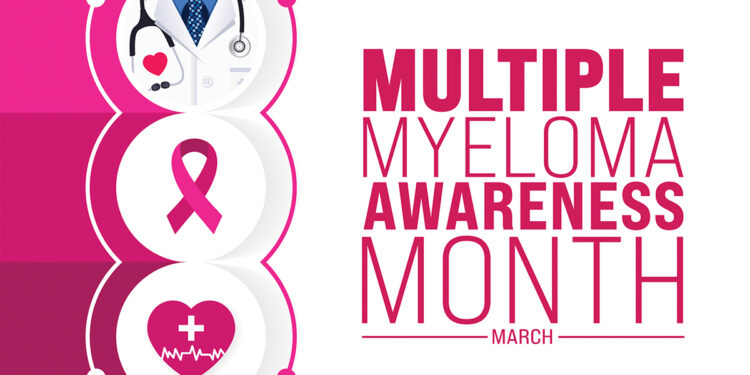Multiple Myeloma Awareness month is March

Story by Lynne Hayes
A Good Time to Learn About This Lesser-Known Cancer
There are cancers that get a great deal of media attention, like breast cancer, colon cancer, and prostate cancer. Other cancers get very little publicity but should. One that ought to be on every adult’s radar is multiple myeloma, a type of bone marrow cancer.
According to the National Cancer Institute’s Surveillance, Epidemiology, and End Results (SEER) Program, more than 35,730 people in the US were diagnosed with multiple myeloma in 2023 and an estimated 12,590 died of the disease.
 Men over 50 are more likely to develop multiple myeloma, and one of every five people diagnosed is African American.
Men over 50 are more likely to develop multiple myeloma, and one of every five people diagnosed is African American.
“We don’t know why certain diseases have higher incidence in certain populations,” shared Dr. M. Salamat, a board-certified medical Oncologist/Hematologist with Providence Medical Group Oncology/Hematology clinic, part of Providence Medical Center.
“There’s a lot of research going on now that indicates at least with one type of multiple myeloma there may be a genetic component, but there’s been nothing definitive as yet.”
Dr. Salamat also points out family history is a known risk factor for multiple myeloma. First-degree relatives of people with multiple myeloma have a 2 to 3 times higher risk of developing the disease.

No Cure, But Treatments Make It Highly Manageable
The good news for those diagnosed multiple myeloma is that, because it typically appears in older adults, it tends to be slowly progressive. What’s more, if caught early, there are many excellent treatments available that can help manage the disease, and others currently in clinical trials are showing great promise.
“We refer to multiple myeloma as a sub-acute form of cancer,” said Dr Salamat. While it’s not curable, it’s highly treatable. When the cancer is diagnosed relatively early, patients can have many quality years of life ahead of them. We are having good luck managing the disease using specific combinations of chemotherapy drugs, as well as with autologous bone marrow transplants, which uses the patients own treated bone marrow for treatment.” Dr. Salamat goes on to say, “Newer CAR T-Cell therapies are now available in which extracted T-cells are ‘sensitized’ to act as delivery vehicles. When they’re placed back in the body, they find and destroy the bad cells. In clinical trials, this therapy has been very successful at attacking and eradicating multiple myeloma cells and another option for myeloma patients.”
Your Best Defense: Regular Annual Checkups
While there are preventive screening tests for some common cancers (think colonoscopy for colorectal cancer, mammogram for breast cancer, PSA for prostate cancer, etc.) multiple myeloma is not part of a typical screening routine.
“Relative to other cancers, multiple myeloma is simply not as common,” noted Dr Salamat. “Therefore, it’s imperative that people commit to annual checkups with their primary care physician (PCP) and, most important, ensure that a routine blood panel is part of that. This panel can pick up key abnormalities associated with multiple myeloma which indicate further testing may be needed.”
Another challenge for patients and physicians, Salamat points out, is that 60 – 70% of people who develop multiple myeloma have no symptoms. Additionally, the symptoms associated with the cancer (bone pain, weakness or fatigue, weight loss, anemia, infections, kidney issues) are also common to other conditions.
“Sometimes, a patient may have a symptom such as bone pain, and an x-ray can reveal the cancer,” he said. “But more often than not, the cancer is discovered through an annual checkup, either through blood tests or a urine sample. Multiple myeloma manifests as high protein levels in the blood and the urine. If these are found, your primary care doctor will likely refer you to a specialist for additional tests.”
Research May Hold the Key to Beating It for Good
Dr. Salamat feels strongly that a cure for multiple myeloma is “not too far off in the future,” and perhaps even a genetic test to screen for a predisposition to develop the cancer. But in the meantime, he strongly advises every adult to get regular annual checkups, familiarize themselves with the cancer’s symptoms, and, if possible, support the research through donations.
“And, if you are diagnosed,” he advises, “get proactive with your care. There are many clinical trials out there, so check with your doctor as well as associations and research foundations to see if you are a candidate.”





